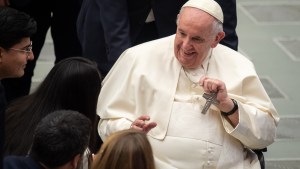When our inner voice is overly negative and our self-talk makes it hard to get through day after day, a solution can be to pay more attention, not less, says the Pope.
Pope Francis gave a series of practical explanations about discernment in 2022. After speaking about prayer, self-knowledge, and desire in prior Wednesday audience catecheses, he considered one’s own life story in the audience of October 19, 2022.
Knowing one’s own life story is, let’s say, an essential ingredient for discernment.
In reflecting on our lives, the Pope warned about “thoughts that lead us away from ourselves.” He described them as “stereotypical messages that harm us.”
For example, “I am worthless” – and it gets you down; “everything goes wrong for me” – and it gets you down; “I will never achieve anything worthwhile” – and it gets you down, and this becomes your life. These pessimistic phrases that get you down!
Pope Francis said that learning to “read” our own history means recognizing when these “toxic elements” are present.
Broaden the narrative
But we aren’t supposed to stop with recognizing them. From there, he said, we must engage in “broadening our narrative, learning to notice other things, making it richer, more respectful of complexity, succeeding also in grasping the discreet ways in which God acts in our life.”
He shared the case of a person who, he recalled, “people said deserved the Nobel Prize in negativity: Everything was bad, everything, and he always tried to put himself down. He was a bitter person, and yet he had many qualities.”
And then this person found another person who helped him, and every time he complained about something, the other one used to say: “But now, to compensate, say something good about yourself.” And he would say: “Well, yes … I also have this quality,” and bit by bit this helped him move forward, to read well his own life, both the bad things and the good things.
So, the Pope said, “We must read our life, and by doing so we see things that are not good and also the good things that God sows in us.”
Then, the Pope continued the emphasis he has made in previous catecheses on this theme of discernment. He said it has a “narrative approach,” not focusing on a concrete action, but placing our actions in a larger context.
He offered the following questions to ask ourselves:
Where does this thought come from?
What I am feeling now, where does it come from?
Where does it lead me, what I am thinking now?
When have I encountered it before?
Is it something new that comes to mind only now, or have I found it other times?
Why is it more insistent than others?
What is life trying to tell me with this?


